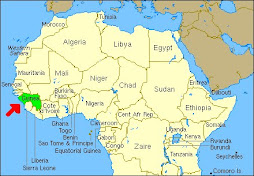I’ve wanted to come to Haiti since 2003. I first heard of an opportunity to volunteer here with a group from Clemson. I was living in France at the time the trip was first proposed, and I immediately knew I wanted to go. I remember thinking “I’ve had a chance to see Europe, and these beautiful developed countries. I need to see how the rest of the world lives.” And that twitch never went away.
The trip was scheduled for the second week in March, 2004. I made plans, raised money, and bought the plane tickets to come. Meanwhile rebels were ravaging the North of Haiti, and civilians were erecting roadblocks around the capital, just blocks from where I live now and buy my roadside pikles. Foreigners were supposedly getting kidnapped from the airport right and left. About ten days before my group was to leave, Haiti’s president, Jean-Bertrand Aristide, was taken from his home in the middle of the night by American and Haitian security forces.
My trip to Haiti was canceled and the group went to rural Kentucky instead. Meanwhile in Haiti… the situation deteriorated. Since then, my curiosity has expanded. Not just to “Why is Haiti so poor?” But also to “Why is Haiti so violent and unstable?”
I just finished my sixth book/movie on the subject of Haiti, An Unbroken Agony. I’d bought the book because I wanted an accurate recent history of the country, the unclear events of 2004 through the present day, and I’d stumbled upon it at my favorite trusted local bookstore in DC. In Haiti today you’ll still get very different opinions depending on whom you talk to regarding former President Aristide, his ouster, and the surrounding political violence that has wracked the country. Sorting out the facts is an on-going project for me.
The book made me so angry I had to put it down and walk away—twice.
What made me so angry? My own government. George Bush, Colin Powell, Condeleeza Rice. The wealthy Haitian elite who live in such a stratified world that it’s unimaginable to them to share in the plight of 90% of their country. The American media that continuously distorts, inaccurately reports, or completely neglects the events in Haiti—part of the reason I never know what to take as fact or fiction.
Let me give you a few examples, quotes from the book, of what set me off.
On Class:
Carl Frobrum, 74, was a fair-skinned society columnist, socialite, and longtime prominent member of South Florida’s community of upwardly mobile Haitian professionals. When his well-to-do peers demanded that Aristide resign his presidency, Fobrum would not go along with them: “I was called a traitor to my class.”
The book describes in detail, based on eye-witness accounts, the events surrounding the kidnapping of President Aristide on February 29, 2004. The book’s author Randal Robinson, along with US Congresswoman Maxine Waters, a Jamaican Parliamentarian, and others flew half-way around the globe to convince the President of the Central African Republic (CAR) to release Aristide and his wife (who is actually an American citizen.) The Aristides were being held indefinitely in this remote and unstable country.
When Senator Waters arrived to speak with President Bozize of the Central African Republic, he asked,
“Do you have a letter from President Bush?”
For a long moment, the room was completely quiet.
“Mr. President, I do not represent President Bush. We are supportive of President Aristide, but this is not true of everyone in the United States.”
For the first time, the Bozize’s expression changed. He looked down at his hands and then straight at Waters. He said two words in French. The meaning in his tone arrived before Aristide’s translation.
“Eh bien” –well—his voice marked with reluctance—he proceeded to confess what we already knew—that he had agreed to detain President Aristide as a favor to the French and the Americans.
“I would have to ask the French who asked me to let Aristide be here. I would have to ask the Americans. Without discussing it with them, I couldn’t just let them go, you understand.”
Colin Powell, Donald Rumsfeld, the works, deny having anything to do with Aristide’s removal from Haiti, which is a load of ****. It was a skillfully orchestrated maneuver, which even included the American media showing footage after the abduction of Aristide, departing on a plane in broad daylight, waving to a crowd. Aristide was in reality taken at gunpoint in the middle of the night in an unmarked plane, which then provided false information to customs officials in Antigua. American personnel on board the plane refused to allow Antiguan customs officials onto the plane for inspection, when it stopped there to refuel en route to CAR. The plane’s personnel later reported that Aristide had met with government officials in Antigua. Not only did the Aristides not even know they’d stopped in Antigua, they were neither allowed off of the plane there nor informed of their destination until moments before arriving in the CAR.
The author states beautifully the conclusions I had come to long before the end of this book:
Lastly, the evidence decisively showed that the United States, with the assistance of France, methodically undermined the political and economic stability of Haiti before abducting its democratically elected president and overthrowing its democratically elected government.
Owing to an extreme imbalance of power and influence between the small middle-income countries of the Caribbean region and the large industrialized nations of North America and Western Europe, calls from Caribbean leaders for an official investigation of the events of the early morning hours of February 29, 2004, were ignored.
The people of the democratic Caribbean were forced, due to their ironic proximity to democratic America, to accept certain realities.
As between the big and the small (i.e., the rich and the poor) nations of the world, there exist no checks and balances. No fair panel of last resort, no higher court before which to petition for recourse, no hierarchy of enforceable rights, no scheme of natural equity or fairness. As long as one member of the global family of nations is free to behave toward a fellow member nation with lethal impunity—to bully, to menace, to invade, to destabilize politically or economically, to reduce to tumult—no country, so threatened, can hope to enjoy the social and political contentment that ought inherently to attend democratic practices.
Since Haitian slaves won their independence from France in 1804, the United States has loomed over Haiti like the sword of Damocles. The record of this abuse of power is well-known to the steadfastly democratic, English-speaking Caribbean nations that have little choice but to heed the chilling implications of this for their own survival. Their leaders have learned the hard way that, within their well-managed tropical island states, no election verdict, no constitutional custom or habit, no parliament’s decision, no ordinary citizen’s commonplace prerogative is safe from an intrusive America whose caprices and policies are neither fairer, nor more predictable, nor more morally conscionable than the vagaries of hurricanes.
My mission of gathering the facts on Haiti and my dear US government is far from over, but I took a moment to write to the author to thank him for the book.


2 comments:
Happy Birthday, Kate!!!!
(And Happy Independence Day to Haiti, too... also, happy New Year's as well.) I read all that stuff you wrote about Haiti, and it made me mad, too. I actually had to stop reading it, scroll down, read about fun Birthday camping, scroll back up, and then finish it. Speaking of fun Birthday camping... (I can't even finish this sentence without laughing about the first/last/only time we were part of the same camping adventure. Hopefully your weather is much much better.) Rock out, drink rum, wash, rinse, repeat.
~Mark
Happy Birthday Kate! I hope camping is fun.
We miss you in DC. How long are you there for?
-Beth
Post a Comment